中考英语新题型——阅读填空专练(1)(含解析)
文档属性
| 名称 | 中考英语新题型——阅读填空专练(1)(含解析) | 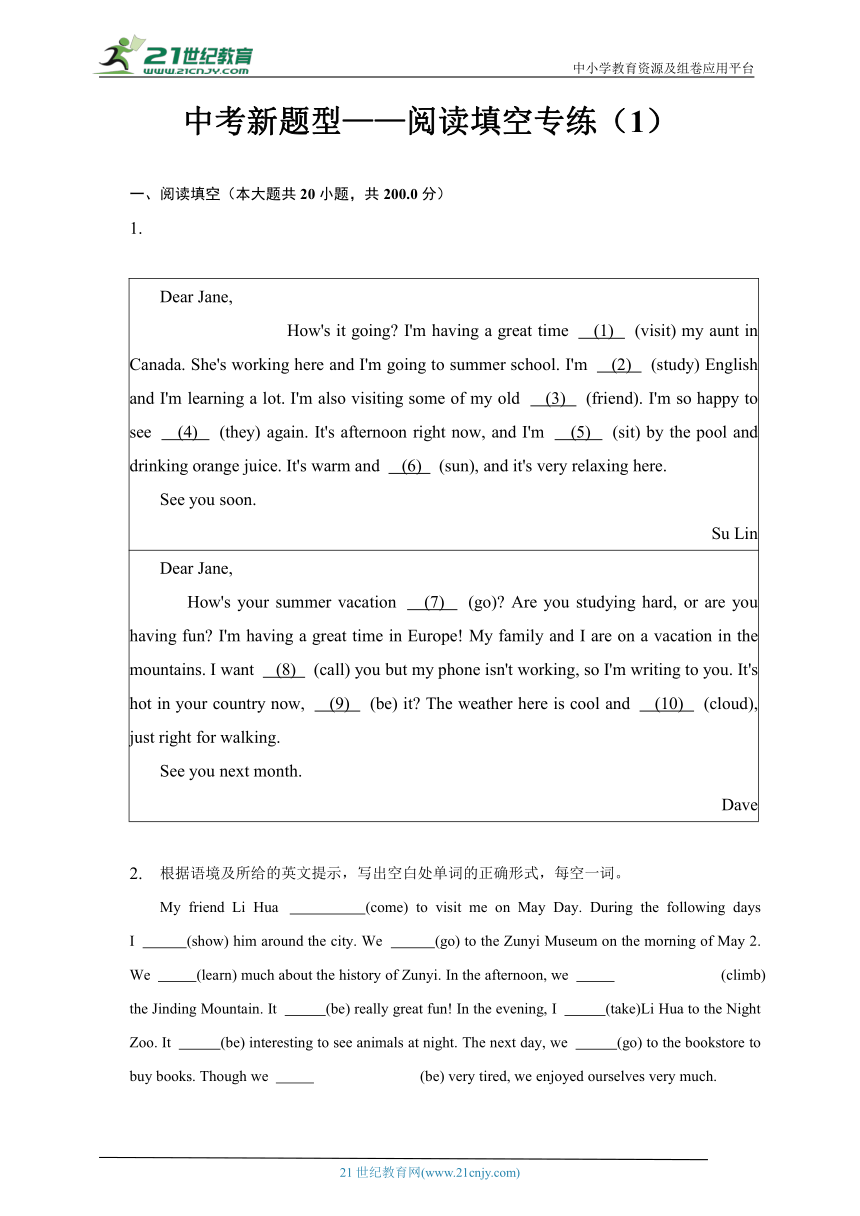 | |
| 格式 | doc | ||
| 文件大小 | 195.0KB | ||
| 资源类型 | 试卷 | ||
| 版本资源 | 人教新目标(Go for it)版 | ||
| 科目 | 英语 | ||
| 更新时间 | 2023-03-28 20:09:33 | ||
图片预览

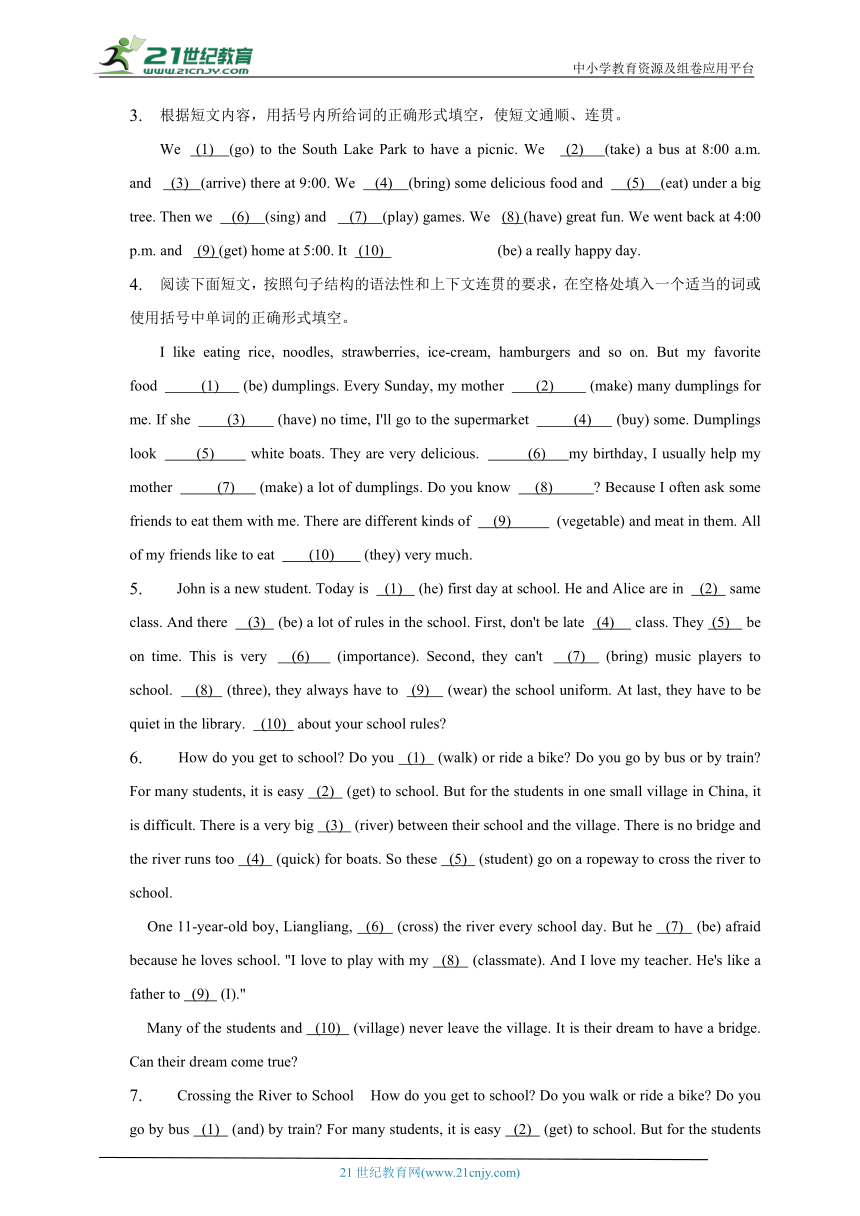
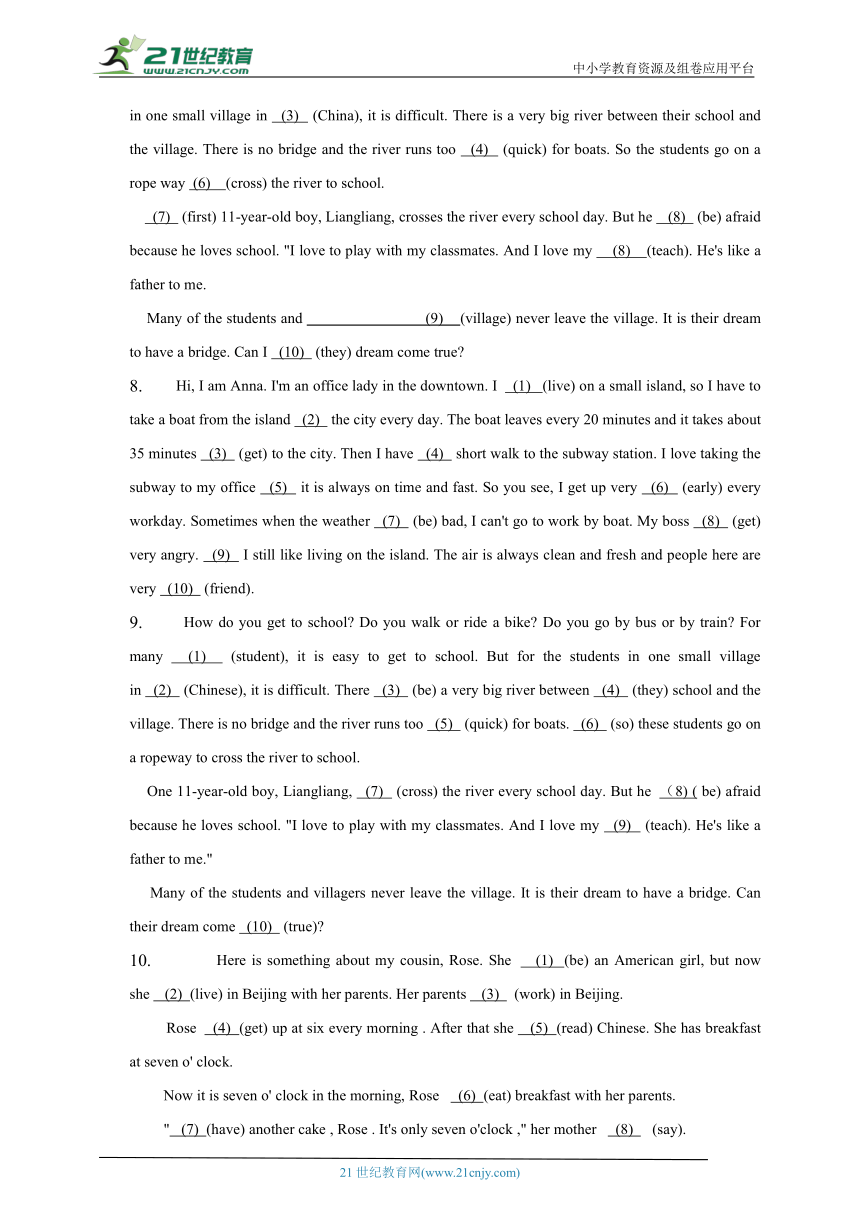
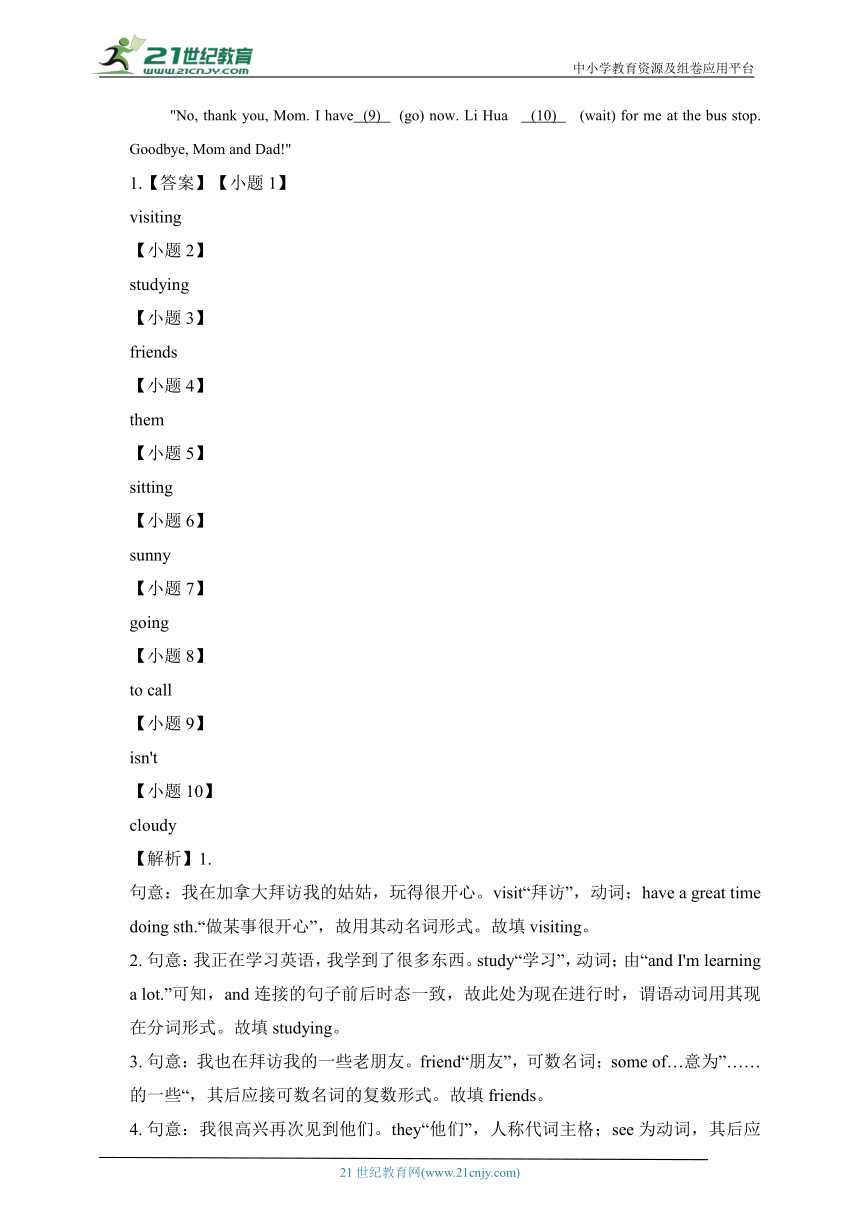
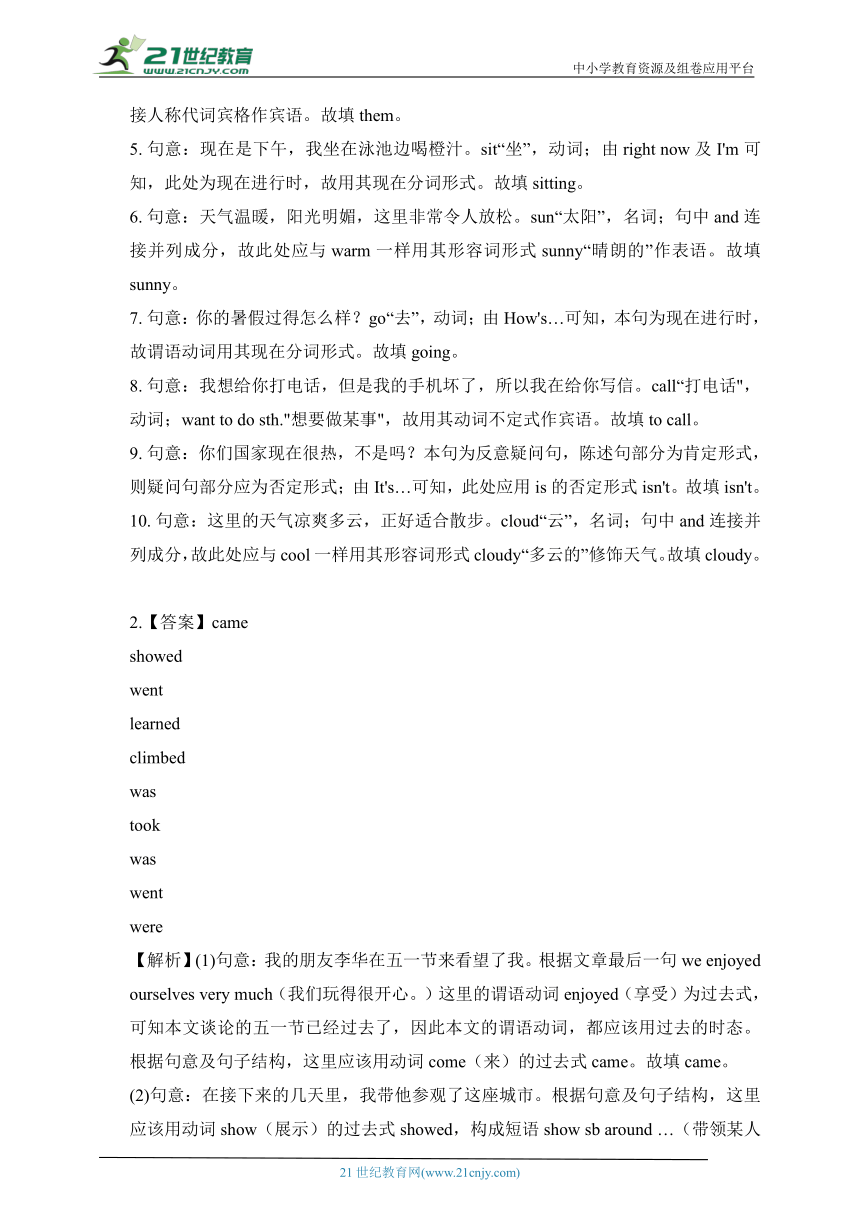
文档简介
中小学教育资源及组卷应用平台
中考新题型——阅读填空专练(1)
一、阅读填空(本大题共20小题,共200.0分)
1.
Dear Jane,
How's it going I'm having a great time (1) (visit) my aunt in Canada. She's working here and I'm going to summer school. I'm (2) (study) English and I'm learning a lot. I'm also visiting some of my old (3) (friend). I'm so happy to see (4) (they) again. It's afternoon right now, and I'm (5) (sit) by the pool and drinking orange juice. It's warm and (6) (sun), and it's very relaxing here.See you soon.Su Lin
Dear Jane,
How's your summer vacation (7) (go) Are you studying hard, or are you having fun I'm having a great time in Europe! My family and I are on a vacation in the mountains. I want (8) (call) you but my phone isn't working, so I'm writing to you. It's hot in your country now, (9) (be) it The weather here is cool and (10) (cloud), just right for walking.See you next month.Dave
2. 根据语境及所给的英文提示,写出空白处单词的正确形式,每空一词。
My friend Li Hua (come) to visit me on May Day. During the following days I (show) him around the city. We (go) to the Zunyi Museum on the morning of May 2. We (learn) much about the history of Zunyi. In the afternoon, we (climb) the Jinding Mountain. It (be) really great fun! In the evening, I (take)Li Hua to the Night Zoo. It (be) interesting to see animals at night. The next day, we (go) to the bookstore to buy books. Though we (be) very tired, we enjoyed ourselves very much.
3. 根据短文内容,用括号内所给词的正确形式填空,使短文通顺、连贯。
We (1) (go) to the South Lake Park to have a picnic. We (2) (take) a bus at 8:00 a.m. and (3) (arrive) there at 9:00. We (4) (bring) some delicious food and (5) (eat) under a big tree. Then we (6) (sing) and (7) (play) games. We (8) (have) great fun. We went back at 4:00 p.m. and (9) (get) home at 5:00. It (10) (be) a really happy day.
4. 阅读下面短文,按照句子结构的语法性和上下文连贯的要求,在空格处填入一个适当的词或使用括号中单词的正确形式填空。
I like eating rice, noodles, strawberries, ice-cream, hamburgers and so on. But my favorite food (1) (be) dumplings. Every Sunday, my mother (2) (make) many dumplings for me. If she (3) (have) no time, I'll go to the supermarket (4) (buy) some. Dumplings look (5) white boats. They are very delicious. (6) my birthday, I usually help my mother (7) (make) a lot of dumplings. Do you know (8) Because I often ask some friends to eat them with me. There are different kinds of (9) (vegetable) and meat in them. All of my friends like to eat (10) (they) very much.
5. John is a new student. Today is (1) (he) first day at school. He and Alice are in (2) same class. And there (3) (be) a lot of rules in the school. First, don't be late (4) class. They (5) be on time. This is very (6) (importance). Second, they can't (7) (bring) music players to school. (8) (three), they always have to (9) (wear) the school uniform. At last, they have to be quiet in the library. (10) about your school rules
6. How do you get to school Do you (1) (walk) or ride a bike Do you go by bus or by train For many students, it is easy (2) (get) to school. But for the students in one small village in China, it is difficult. There is a very big (3) (river) between their school and the village. There is no bridge and the river runs too (4) (quick) for boats. So these (5) (student) go on a ropeway to cross the river to school.
One 11-year-old boy, Liangliang, (6) (cross) the river every school day. But he (7) (be) afraid because he loves school. "I love to play with my (8) (classmate). And I love my teacher. He's like a father to (9) (I)."
Many of the students and (10) (village) never leave the village. It is their dream to have a bridge. Can their dream come true
7. Crossing the River to School How do you get to school Do you walk or ride a bike Do you go by bus (1) (and) by train For many students, it is easy (2) (get) to school. But for the students in one small village in (3) (China), it is difficult. There is a very big river between their school and the village. There is no bridge and the river runs too (4) (quick) for boats. So the students go on a rope way (6) (cross) the river to school.
(7) (first) 11-year-old boy, Liangliang, crosses the river every school day. But he (8) (be) afraid because he loves school. "I love to play with my classmates. And I love my (8) (teach). He's like a father to me.
Many of the students and (9) (village) never leave the village. It is their dream to have a bridge. Can I (10) (they) dream come true
8. Hi, I am Anna. I'm an office lady in the downtown. I (1) (live) on a small island, so I have to take a boat from the island (2) the city every day. The boat leaves every 20 minutes and it takes about 35 minutes (3) (get) to the city. Then I have (4) short walk to the subway station. I love taking the subway to my office (5) it is always on time and fast. So you see, I get up very (6) (early) every workday. Sometimes when the weather (7) (be) bad, I can't go to work by boat. My boss (8) (get) very angry. (9) I still like living on the island. The air is always clean and fresh and people here are very (10) (friend).
9. How do you get to school Do you walk or ride a bike Do you go by bus or by train For many (1) (student), it is easy to get to school. But for the students in one small village in (2) (Chinese), it is difficult. There (3) (be) a very big river between (4) (they) school and the village. There is no bridge and the river runs too (5) (quick) for boats. (6) (so) these students go on a ropeway to cross the river to school.
One 11-year-old boy, Liangliang, (7) (cross) the river every school day. But he (8) ( be) afraid because he loves school. "I love to play with my classmates. And I love my (9) (teach). He's like a father to me."
Many of the students and villagers never leave the village. It is their dream to have a bridge. Can their dream come (10) (true)
10. Here is something about my cousin, Rose. She (1) (be) an American girl, but now she (2) (live) in Beijing with her parents. Her parents (3) (work) in Beijing.
Rose (4) (get) up at six every morning . After that she (5) (read) Chinese. She has breakfast at seven o' clock.
Now it is seven o' clock in the morning, Rose (6) (eat) breakfast with her parents.
" (7) (have) another cake , Rose . It's only seven o'clock ," her mother (8) (say).
"No, thank you, Mom. I have (9) (go) now. Li Hua (10) (wait) for me at the bus stop. Goodbye, Mom and Dad!"
1.【答案】【小题1】
visiting
【小题2】
studying
【小题3】
friends
【小题4】
them
【小题5】
sitting
【小题6】
sunny
【小题7】
going
【小题8】
to call
【小题9】
isn't
【小题10】
cloudy
【解析】1.
句意:我在加拿大拜访我的姑姑,玩得很开心。visit“拜访”,动词;have a great time doing sth.“做某事很开心”,故用其动名词形式。故填visiting。
2. 句意:我正在学习英语,我学到了很多东西。study“学习”,动词;由“and I'm learning a lot.”可知,and连接的句子前后时态一致,故此处为现在进行时,谓语动词用其现在分词形式。故填studying。
3. 句意:我也在拜访我的一些老朋友。friend“朋友”,可数名词;some of…意为”……的一些“,其后应接可数名词的复数形式。故填friends。
4. 句意:我很高兴再次见到他们。they“他们”,人称代词主格;see为动词,其后应接人称代词宾格作宾语。故填them。
5. 句意:现在是下午,我坐在泳池边喝橙汁。sit“坐”,动词;由right now及I'm可知,此处为现在进行时,故用其现在分词形式。故填sitting。
6. 句意:天气温暖,阳光明媚,这里非常令人放松。sun“太阳”,名词;句中and连接并列成分,故此处应与warm一样用其形容词形式sunny“晴朗的”作表语。故填sunny。
7. 句意:你的暑假过得怎么样?go“去”,动词;由How's…可知,本句为现在进行时,故谓语动词用其现在分词形式。故填going。
8. 句意:我想给你打电话,但是我的手机坏了,所以我在给你写信。call“打电话",动词;want to do sth."想要做某事",故用其动词不定式作宾语。故填to call。
9. 句意:你们国家现在很热,不是吗?本句为反意疑问句,陈述句部分为肯定形式,则疑问句部分应为否定形式;由It's…可知,此处应用is的否定形式isn't。故填isn't。
10. 句意:这里的天气凉爽多云,正好适合散步。cloud“云”,名词;句中and连接并列成分,故此处应与cool一样用其形容词形式cloudy“多云的”修饰天气。故填cloudy。
2.【答案】came
showed
went
learned
climbed
was
took
was
went
were
【解析】(1)句意:我的朋友李华在五一节来看望了我。根据文章最后一句we enjoyed ourselves very much(我们玩得很开心。)这里的谓语动词enjoyed(享受)为过去式,可知本文谈论的五一节已经过去了,因此本文的谓语动词,都应该用过去的时态。根据句意及句子结构,这里应该用动词come(来)的过去式came。故填came。
(2)句意:在接下来的几天里,我带他参观了这座城市。根据句意及句子结构,这里应该用动词show(展示)的过去式showed,构成短语show sb around …(带领某人参观……)。故填showed。
(3)句意:5月2日上午,我们去了遵义博物馆。根据句意及句子结构,这里应该用动词go(去)的过去式went。故填went。
(4)句意:我们了解了很多遵义的历史。根据句意及句子结构,这里应该用动词learn(学习)的过去式learned。故填learned。
(5)句意:下午,我们爬了金顶山。根据句意及句子结构,这里应该用动词climb(爬)的过去式climbed。故填climbed。
(6)句意:那真是太好玩了!根据句意及句子结构,本句主语是人称代词it(它),表示单数概念,因此这里应该用系动词was。故填was。
(7)句意:晚上,我带李华去夜间动物园。根据句意及句子结构,这里应该用动词take(带)的过去式took。故填took。
(8)句意:晚上看动物很有趣。根据句意及句子结构,本句主语是人称代词it(它),表示单数概念,因此这里应该用故填was。
(9)句意:第二天,我们去书店买书。根据句意及句子结构,这里应该用动词go(去)的过去式went。故填went。
(10)句意:虽然我们很累,但我们玩得很开心。根据句意及句子结构,本句主语是人称代词we(我们),表示复数概念,因此这里应该用系动词were。故填were。
3.【答案】【小题1】
went
【小题2】
took
【小题3】
arrived
【小题4】
brought
【小题5】
ate
【小题6】
sang
【小题7】
played
【小题8】
had
【小题9】
got
【小题10】
was
【解析】1. 句意:我们去南湖公园野餐。由语境可知,本文讲述的过去发生的事情,用一般过去时,谓语动词用过去式;go“去”,其过去式是went。故填went。
2. 句意:我们早上8点乘公共汽车,9点到达那里。此句讲述过去发生的事情,用一般过去时,谓语动词用过去式;take“乘坐”,其过去式是took。故填took。
3. 句意:我们早上8点乘公共汽车,9点到达那里。此句是并列句,此处用过去式,arrive“到达”,其过去式是arrived。故填arrived。
4. 句意:我们带了一些美味的食物,在一棵大树下吃了起来。此句表示过去发生的事情,用一般过去时,谓语动词用过去式。bring“带来”,其过去式是brought。故填brought。
5. 句意:我们带了一些美味的食物,在一棵大树下吃了起来。此句是并列句,此处用过去式;eat“吃”,其过去式是ate。故填ate。
6. 句意:然后我们唱歌,玩游戏。此句是一般过去时,谓语动词用过去式;sing“唱歌”,其过去式是sang。故填sang。
7. 句意:然后我们唱歌,玩游戏。此句是一般过去时,谓语动词用过去式;play games“玩游戏”,play的过去式是played。故填played。
8. 句意:我们玩得很开心。此句是一般过去时,谓语动词用过去式;have great fun“玩得开心”,固定短语,have的过去式是had。故填had。
9. 句意:我们下午4点回去,5点到家。此句是一般过去时,谓语动词用过去式;get home“到家”,get的过去式是got。故填got。
10. 句意:那真是快乐的一天。此句是一般过去时,谓语动词用过去式,主语It是第三人称单数,be动词用was。故填was。
4.【答案】【小题1】
is
【小题2】
makes
【小题3】
has
【小题4】
to buy
【小题5】
like
【小题6】
On
【小题7】
make
【小题8】
why
【小题9】
vegetables
【小题10】
them
【解析】1. 句意:但是我最喜欢的食物是饺子。此处陈述客观事实,时态为一般现在时,主语food是不可数名词,be动词用is。
2. 句意:每个周日,我的妈妈都给我包好多饺子。make制作,动词。结合Every Sunday可知时态为一般现在时,主语my mother是名词单数,动词make需用第三人称单数形式makes。
3. 句意:如果她没有时间,我将去超市买一些。have有,动词。if引导的条件状语从句,时态遵循“主将从现”原则,设空处在从句中,时态为一般现在时。从句主语是she,动词have需用第三人称单数形式has。
4. buy买,动词。此处表达的含义为“我将去超市买一些”, to buy为不定式结构,用来表示目的。
5. 句意:饺子看起来像白色的船。根据look......white boats可知,look like表示“看起来像”,固定搭配。
6. 句意:在我生日那天,我通常帮妈妈包很多饺子。根据my birthday可知,此处表达的含义为“在我生日那天”,是具体的某一天,所以用介词on。注意句首首字母大写。
7. make制作,动词。help sb. do sth.帮助某人做某事,固定搭配,此处应填入动词原形 make。
8. 句意:你知道为什么吗?由Because I often ask some friends to eat them with me.可知,此处表达的含义为“你知道为什么吗”。why意为“为什么”。
9. 句意:它们里面有不同种类的蔬菜和肉。vegetable蔬菜,可数名词,结合 different kinds of(不同种类的)可知,需用其复数形式vegetables。
10. 句意:我的所有朋友非常喜欢吃它们。they他们,人称代词的主格。eat是动词,其后应使用宾格代词them作动词宾语。
5.【答案】【小题1】
his
【小题2】
the
【小题3】
are
【小题4】
for
【小题5】
must
【小题6】
important
【小题7】
bring
【小题8】
Third
【小题9】
wear
【小题10】
What/How
【解析】1. 根据Today is (1) (he) first day at school,可知空格处应填形容词性物主代词,修饰first day。he他,人称代词主格,his他的,形容词性物主代词。
2. 根据He and Alice are in (2) same class.,可知空格处应填the,same前面加the,the same......,相同的......,固定用法。
3. 根据And there (3) (be)a lot of rules in the school.,可知本句是there be句型。本句叙述一事实现象,用一般现在时。主语rules是可数名词复数,be动词用are.
4. 根据don t be late (4) class,可知空格处应填for,be late for..., ......迟到,固定短语。
5. 本段谈论校规,根据They (5) be on time.,可知本句谈到的校规是他们必须按时到校。must必须,情态动词,后跟动词原形。
6. 根据This is very (6) (importance),可知空格处应填形容词,作表语。importance重要性,名词,important重要的,形容词。
7. bring带来,此处为本句谓语动词,can't后跟动词原形。
8. 根据上文 First, ...Second, ...可知次处应填Third,第三,列举第三条校规。
9. wear穿,动词,have to 后跟动词原形。
10. 上文列举约翰学校的校规,结合 (10) about your school rules ,可知空格处应填What/How,问你的校规是什么呢。What/How about...,......怎么样。句首首字母大写。
6.【答案】【小题1】
walk
【小题2】
to get
【小题3】
river
【小题4】
quickly
【小题5】
students
【小题6】
crosses
【小题7】
is not/isn't
【小题8】
classmates
【小题9】
me
【小题10】
villagers
【解析】1. walk走路,动词。此处是一般疑问句,助动词后面应该跟动词原形。故填walk。
2. get to到达,固定短语。分析句子可知,此处是固定句型it is+adj+to do sth,意为“做某事怎么样”,空处需要动词不定式。故填to get。
3. river河流,可数名词,根据空前不定冠词a可知,此处需要名词单数形式。故填river。
4. quick快速的,形容词;quickly快速地,副词。分析句子可知,此处为副词修饰谓语动词runs。故填quickly。
5. student学生,可数名词,复数形式为students。根据空前these可知,此处需要名词复数。故填students。
6. cross横穿,动词。根据句中every school day可知,此处描述经常性动作,用一般现在时。主语Liangliang是专有名词,谓语动词用第三人称单数形式。故填crosses。
7. 根据语境可知,本文通篇使用一般现在时,所以此处也用一般现在时。be afraid害怕,固定短语;结合句中because he loves school.可知,此处为否定形式,在be动词后面加not,表示“不害怕”。主语he是第三人称单数,系动词应该用is。故填is not。
8. 句意:我喜欢和我的同学们玩。classmate同学,可数名词,复数为classmates。根据语境可知,同学不止一个,所以需要名词复数。故填classmates。
9. 句意:对我来说,他就像一个父亲。to是介词,后跟代词宾格。I我,代词主格;me我,代词宾格。故填me。
10. 句意:许多学生和村民从未离开过这个村庄。village村庄,可数名词;villager村民,可数名词,复数为villagers。根据never leave the village可知,此处指村民,and连接并列成分,前后形式应该一致,前面用的是名词复数,所以此处也用名词复数。故填villagers。
7.【答案】【小题1】
or
【小题2】
to get
【小题3】
China
【小题4】
quickly
【小题5】
to cross
【小题6】
One
【小题7】
isn't
【小题8】
teacher
【小题9】
villagers
【小题10】
their
【解析】1. 句意:你坐公共汽车还是坐火车?and和,本句为一般疑问句,用连词or表示选择。
2. 句意:对许多学生来说,上学很容易。固定句型It is+adj+to do sth做某事是……的,不定式作真正的主语。故填to get。
3. 句意:但对于中国一个小村庄的学生来说,这很难。China中国,专有名词。
4. 句意:那里没有桥,河水流得太快,船无法通行。quick迅速的,此处用副词修饰动词run。故填quickly。
5. 句意:于是这些学生就搭索道过河去上学。不定式作目的状语。故填to cross。
6. 句意:一个11岁的男孩亮亮每天上学都要过河。first序数词第一,此处用基数词one表示“一个”。
7. 句意:但他不害怕因为他喜欢学校。根据but可知,此处用否定形式,表示不害怕。主语是he为第三人称单数,be动词用is,本句为一般现在时,故填isn't。
8. 句意:我爱我的老师。根据下文He s like a father to me.(他对我来说就像父亲一样。)可知,名词用单数形式。故填teacher。
9. 句意:许多学生和村民从未离开过村庄。village村庄,此处指人用villager表示村民。根据many可知,用复数形式villagers。
10. 根据dream可知,此处用形容词性物主代词their修饰名词。
8.【答案】【小题1】
live
【小题2】
to
【小题3】
to get
【小题4】
a
【小题5】
because
【小题6】
early
【小题7】
is
【小题8】
gets
【小题9】
But
【小题10】
friendly
【解析】1. 句意:我住在一个小岛上,所以每天必须乘船从岛到市里。live居住,动词,这里描述的是客观事实情况,因此句子用一般现在时,主语I是第一人称单数,因此live用动词原形。
2. 句意同上。from...to...从......到......,固定搭配。
3. 句意:船每二十分钟一班,到城市大约花三十五分钟。get to到达,根据it takes+时间+to do sth.固定句型,因此get用动词不定式to get作句子真正的主语。
4. 句意:然后我走一小段路到地铁站。根据walk是可数单数且short首音是辅音音素,因此此空填不定冠词a,have a short walk走一小段路,固定搭配。
5. 句意:我喜欢搭地铁到我的办公室,因为它总是又准时又快。分析句意,可知it is always on time and fast是我喜欢搭地铁到我的办公室的原因,用because表原因,引导原因状语从句。
6. 句意:所以你看,我每个工作日都非常早就起床。early早地,副词,修饰动词get up。
7. 句意:有时当天气不好的时候,我没法乘船去上班。when引导时间状语从句,从句用一般现在时表将来,主语the weather是不可数名词,因此be动词用is。
8. 句意:我的老板非常生气。get变得,动词,句子描述的是客观事实,因此句子用一般现在时,主语My boss是可数名词单数,因此get用第三人称单数形式gets。
9. 句意:但是我仍然喜欢住在岛上。分析句意,可知Sometimes when the weather (7) (be) bad, I can't go to work by boat. My boss (8) (get) very angry.和I still like living on the island这两句话是转折对立关系,用but表转折,注意句首的单词首字母要大写。
10. 句意:这里空气总是很干净和清新,人们非常友好。friend朋友,这里修饰主语people here,需要用形容词friendly,友好的,句中作表语。
9.【答案】【小题1】
students
【小题2】
China
【小题3】
is
【小题4】
their
【小题5】
quickly
【小题6】
So
【小题7】
crosses
【小题8】
is not/isn't
【小题9】
teacher
【小题10】
true
【解析】1. 句意:对于许多学生来说,上学是容易的。many应修饰复数名词,故填students。
2. 句意:但是对于一个在中国的小山村里的学生来说,它是难的。China是Chinese的名词形式,故填China。
3. 句意:在他们的学校和村庄之间有一条非常大的河。本题为There be句型,其主语为a very big river,是单数,因此be应用is,故填is。
4. 句意:在他们的学校和村庄之间有一条非常大的河。他们的是they的物主代词their,故填their。
5. 句意:河上没有桥,并且河水流的非常快以至于不能渡船。quick是形容词,应用其副词quickly修饰动词,故填quickly。
6. 句意:因此这些学生们要滑索道过河去上学。因此用so,在句子开头要大写。故填So。
7. 句意:一个11岁的男孩,亮亮,每天上学要过河。主语为亮亮,第三人称单数,因此cross应用第三人称单数的形式crosses,应填crosses。
8. 句意:但是他不害怕的,因为他爱上学。主语为he,是第三人称单数,因此应用is not/isn't,故填is not/isn't.
9. 句意:我喜欢和我的同班同学一起玩,我爱我的老师。老师teacher,teach是动词,教。故填teacher。
10. 句意:他们的梦想能够实现吗?这里是短语come true 实现。故填true。
10.【答案】【小题1】
is
【小题2】
lives
【小题3】
work
【小题4】
gets
【小题5】
reads
【小题6】
is eating
【小题7】
Have
【小题8】
says
【小题9】
to go
【小题10】
is waiting
【解析】1. 句意:她是个美国的女孩。这是一个介绍人的日常生活状况的短文,所以应该用一般现在时态。这里是be动词,主语是she,三单人称。结合句意,故填is。
2. 句意:但是现在她和父母一起住在北京。live居住,动词。因为要用一般现在时态,主语是she要谓语三单。结合句意,故填lives。
3. 句意:她的父母在北京工作。work工作,谓语动词,句子要用一般现在时态,主语是her parents,是复数,所以谓语用复数。结合句意,故填work。
4. 句意:Rose每天早晨六点起床。因为要用一般现在时态,主语是Rose,三单人称,所以谓语动词要三单。结合句意,故填gets。
5. 句意:在那之后,她看语文。句子要用一般现在时态,read在这是谓语动词,主语是she,三单,所以谓语要三单。结合句意,故填reads。
6. 句意:现在是早晨七点,Rose和她的父母正在吃早饭。七点是时刻,在特定时刻某事正在发生应该是现在进行时态。主语是Rose,三单,所以时态中的be应该用is,eat直接加ing。结合句意和时态结构,故填is eating。
7. 句意:Rose,再吃一块蛋糕。祈使句的肯定形式,需用动词原形,首字母大写。结合句意,故填Have。
8. 句意:她的妈妈说。句子要用一般现在时态,she是三单主语,所以谓语也要三单。结合句意,故填says。
9. 句意:我现在不得不走了。have to不得不,其后接动词原形,指不得不做某事。结合句意,故填to go。
10. 句意:李华正在汽车站等我。根据前面一句可知他不得不走,说明李华正在等,所以要用现在进行时态。李华是三单主语,所以be要用is,动词wait直接加ing。结合句意,故填is waiting。
21世纪教育网 www.21cnjy.com 精品试卷·第 2 页 (共 2 页)
HYPERLINK "http://21世纪教育网(www.21cnjy.com)
" 21世纪教育网(www.21cnjy.com)
中考新题型——阅读填空专练(1)
一、阅读填空(本大题共20小题,共200.0分)
1.
Dear Jane,
How's it going I'm having a great time (1) (visit) my aunt in Canada. She's working here and I'm going to summer school. I'm (2) (study) English and I'm learning a lot. I'm also visiting some of my old (3) (friend). I'm so happy to see (4) (they) again. It's afternoon right now, and I'm (5) (sit) by the pool and drinking orange juice. It's warm and (6) (sun), and it's very relaxing here.See you soon.Su Lin
Dear Jane,
How's your summer vacation (7) (go) Are you studying hard, or are you having fun I'm having a great time in Europe! My family and I are on a vacation in the mountains. I want (8) (call) you but my phone isn't working, so I'm writing to you. It's hot in your country now, (9) (be) it The weather here is cool and (10) (cloud), just right for walking.See you next month.Dave
2. 根据语境及所给的英文提示,写出空白处单词的正确形式,每空一词。
My friend Li Hua (come) to visit me on May Day. During the following days I (show) him around the city. We (go) to the Zunyi Museum on the morning of May 2. We (learn) much about the history of Zunyi. In the afternoon, we (climb) the Jinding Mountain. It (be) really great fun! In the evening, I (take)Li Hua to the Night Zoo. It (be) interesting to see animals at night. The next day, we (go) to the bookstore to buy books. Though we (be) very tired, we enjoyed ourselves very much.
3. 根据短文内容,用括号内所给词的正确形式填空,使短文通顺、连贯。
We (1) (go) to the South Lake Park to have a picnic. We (2) (take) a bus at 8:00 a.m. and (3) (arrive) there at 9:00. We (4) (bring) some delicious food and (5) (eat) under a big tree. Then we (6) (sing) and (7) (play) games. We (8) (have) great fun. We went back at 4:00 p.m. and (9) (get) home at 5:00. It (10) (be) a really happy day.
4. 阅读下面短文,按照句子结构的语法性和上下文连贯的要求,在空格处填入一个适当的词或使用括号中单词的正确形式填空。
I like eating rice, noodles, strawberries, ice-cream, hamburgers and so on. But my favorite food (1) (be) dumplings. Every Sunday, my mother (2) (make) many dumplings for me. If she (3) (have) no time, I'll go to the supermarket (4) (buy) some. Dumplings look (5) white boats. They are very delicious. (6) my birthday, I usually help my mother (7) (make) a lot of dumplings. Do you know (8) Because I often ask some friends to eat them with me. There are different kinds of (9) (vegetable) and meat in them. All of my friends like to eat (10) (they) very much.
5. John is a new student. Today is (1) (he) first day at school. He and Alice are in (2) same class. And there (3) (be) a lot of rules in the school. First, don't be late (4) class. They (5) be on time. This is very (6) (importance). Second, they can't (7) (bring) music players to school. (8) (three), they always have to (9) (wear) the school uniform. At last, they have to be quiet in the library. (10) about your school rules
6. How do you get to school Do you (1) (walk) or ride a bike Do you go by bus or by train For many students, it is easy (2) (get) to school. But for the students in one small village in China, it is difficult. There is a very big (3) (river) between their school and the village. There is no bridge and the river runs too (4) (quick) for boats. So these (5) (student) go on a ropeway to cross the river to school.
One 11-year-old boy, Liangliang, (6) (cross) the river every school day. But he (7) (be) afraid because he loves school. "I love to play with my (8) (classmate). And I love my teacher. He's like a father to (9) (I)."
Many of the students and (10) (village) never leave the village. It is their dream to have a bridge. Can their dream come true
7. Crossing the River to School How do you get to school Do you walk or ride a bike Do you go by bus (1) (and) by train For many students, it is easy (2) (get) to school. But for the students in one small village in (3) (China), it is difficult. There is a very big river between their school and the village. There is no bridge and the river runs too (4) (quick) for boats. So the students go on a rope way (6) (cross) the river to school.
(7) (first) 11-year-old boy, Liangliang, crosses the river every school day. But he (8) (be) afraid because he loves school. "I love to play with my classmates. And I love my (8) (teach). He's like a father to me.
Many of the students and (9) (village) never leave the village. It is their dream to have a bridge. Can I (10) (they) dream come true
8. Hi, I am Anna. I'm an office lady in the downtown. I (1) (live) on a small island, so I have to take a boat from the island (2) the city every day. The boat leaves every 20 minutes and it takes about 35 minutes (3) (get) to the city. Then I have (4) short walk to the subway station. I love taking the subway to my office (5) it is always on time and fast. So you see, I get up very (6) (early) every workday. Sometimes when the weather (7) (be) bad, I can't go to work by boat. My boss (8) (get) very angry. (9) I still like living on the island. The air is always clean and fresh and people here are very (10) (friend).
9. How do you get to school Do you walk or ride a bike Do you go by bus or by train For many (1) (student), it is easy to get to school. But for the students in one small village in (2) (Chinese), it is difficult. There (3) (be) a very big river between (4) (they) school and the village. There is no bridge and the river runs too (5) (quick) for boats. (6) (so) these students go on a ropeway to cross the river to school.
One 11-year-old boy, Liangliang, (7) (cross) the river every school day. But he (8) ( be) afraid because he loves school. "I love to play with my classmates. And I love my (9) (teach). He's like a father to me."
Many of the students and villagers never leave the village. It is their dream to have a bridge. Can their dream come (10) (true)
10. Here is something about my cousin, Rose. She (1) (be) an American girl, but now she (2) (live) in Beijing with her parents. Her parents (3) (work) in Beijing.
Rose (4) (get) up at six every morning . After that she (5) (read) Chinese. She has breakfast at seven o' clock.
Now it is seven o' clock in the morning, Rose (6) (eat) breakfast with her parents.
" (7) (have) another cake , Rose . It's only seven o'clock ," her mother (8) (say).
"No, thank you, Mom. I have (9) (go) now. Li Hua (10) (wait) for me at the bus stop. Goodbye, Mom and Dad!"
1.【答案】【小题1】
visiting
【小题2】
studying
【小题3】
friends
【小题4】
them
【小题5】
sitting
【小题6】
sunny
【小题7】
going
【小题8】
to call
【小题9】
isn't
【小题10】
cloudy
【解析】1.
句意:我在加拿大拜访我的姑姑,玩得很开心。visit“拜访”,动词;have a great time doing sth.“做某事很开心”,故用其动名词形式。故填visiting。
2. 句意:我正在学习英语,我学到了很多东西。study“学习”,动词;由“and I'm learning a lot.”可知,and连接的句子前后时态一致,故此处为现在进行时,谓语动词用其现在分词形式。故填studying。
3. 句意:我也在拜访我的一些老朋友。friend“朋友”,可数名词;some of…意为”……的一些“,其后应接可数名词的复数形式。故填friends。
4. 句意:我很高兴再次见到他们。they“他们”,人称代词主格;see为动词,其后应接人称代词宾格作宾语。故填them。
5. 句意:现在是下午,我坐在泳池边喝橙汁。sit“坐”,动词;由right now及I'm可知,此处为现在进行时,故用其现在分词形式。故填sitting。
6. 句意:天气温暖,阳光明媚,这里非常令人放松。sun“太阳”,名词;句中and连接并列成分,故此处应与warm一样用其形容词形式sunny“晴朗的”作表语。故填sunny。
7. 句意:你的暑假过得怎么样?go“去”,动词;由How's…可知,本句为现在进行时,故谓语动词用其现在分词形式。故填going。
8. 句意:我想给你打电话,但是我的手机坏了,所以我在给你写信。call“打电话",动词;want to do sth."想要做某事",故用其动词不定式作宾语。故填to call。
9. 句意:你们国家现在很热,不是吗?本句为反意疑问句,陈述句部分为肯定形式,则疑问句部分应为否定形式;由It's…可知,此处应用is的否定形式isn't。故填isn't。
10. 句意:这里的天气凉爽多云,正好适合散步。cloud“云”,名词;句中and连接并列成分,故此处应与cool一样用其形容词形式cloudy“多云的”修饰天气。故填cloudy。
2.【答案】came
showed
went
learned
climbed
was
took
was
went
were
【解析】(1)句意:我的朋友李华在五一节来看望了我。根据文章最后一句we enjoyed ourselves very much(我们玩得很开心。)这里的谓语动词enjoyed(享受)为过去式,可知本文谈论的五一节已经过去了,因此本文的谓语动词,都应该用过去的时态。根据句意及句子结构,这里应该用动词come(来)的过去式came。故填came。
(2)句意:在接下来的几天里,我带他参观了这座城市。根据句意及句子结构,这里应该用动词show(展示)的过去式showed,构成短语show sb around …(带领某人参观……)。故填showed。
(3)句意:5月2日上午,我们去了遵义博物馆。根据句意及句子结构,这里应该用动词go(去)的过去式went。故填went。
(4)句意:我们了解了很多遵义的历史。根据句意及句子结构,这里应该用动词learn(学习)的过去式learned。故填learned。
(5)句意:下午,我们爬了金顶山。根据句意及句子结构,这里应该用动词climb(爬)的过去式climbed。故填climbed。
(6)句意:那真是太好玩了!根据句意及句子结构,本句主语是人称代词it(它),表示单数概念,因此这里应该用系动词was。故填was。
(7)句意:晚上,我带李华去夜间动物园。根据句意及句子结构,这里应该用动词take(带)的过去式took。故填took。
(8)句意:晚上看动物很有趣。根据句意及句子结构,本句主语是人称代词it(它),表示单数概念,因此这里应该用故填was。
(9)句意:第二天,我们去书店买书。根据句意及句子结构,这里应该用动词go(去)的过去式went。故填went。
(10)句意:虽然我们很累,但我们玩得很开心。根据句意及句子结构,本句主语是人称代词we(我们),表示复数概念,因此这里应该用系动词were。故填were。
3.【答案】【小题1】
went
【小题2】
took
【小题3】
arrived
【小题4】
brought
【小题5】
ate
【小题6】
sang
【小题7】
played
【小题8】
had
【小题9】
got
【小题10】
was
【解析】1. 句意:我们去南湖公园野餐。由语境可知,本文讲述的过去发生的事情,用一般过去时,谓语动词用过去式;go“去”,其过去式是went。故填went。
2. 句意:我们早上8点乘公共汽车,9点到达那里。此句讲述过去发生的事情,用一般过去时,谓语动词用过去式;take“乘坐”,其过去式是took。故填took。
3. 句意:我们早上8点乘公共汽车,9点到达那里。此句是并列句,此处用过去式,arrive“到达”,其过去式是arrived。故填arrived。
4. 句意:我们带了一些美味的食物,在一棵大树下吃了起来。此句表示过去发生的事情,用一般过去时,谓语动词用过去式。bring“带来”,其过去式是brought。故填brought。
5. 句意:我们带了一些美味的食物,在一棵大树下吃了起来。此句是并列句,此处用过去式;eat“吃”,其过去式是ate。故填ate。
6. 句意:然后我们唱歌,玩游戏。此句是一般过去时,谓语动词用过去式;sing“唱歌”,其过去式是sang。故填sang。
7. 句意:然后我们唱歌,玩游戏。此句是一般过去时,谓语动词用过去式;play games“玩游戏”,play的过去式是played。故填played。
8. 句意:我们玩得很开心。此句是一般过去时,谓语动词用过去式;have great fun“玩得开心”,固定短语,have的过去式是had。故填had。
9. 句意:我们下午4点回去,5点到家。此句是一般过去时,谓语动词用过去式;get home“到家”,get的过去式是got。故填got。
10. 句意:那真是快乐的一天。此句是一般过去时,谓语动词用过去式,主语It是第三人称单数,be动词用was。故填was。
4.【答案】【小题1】
is
【小题2】
makes
【小题3】
has
【小题4】
to buy
【小题5】
like
【小题6】
On
【小题7】
make
【小题8】
why
【小题9】
vegetables
【小题10】
them
【解析】1. 句意:但是我最喜欢的食物是饺子。此处陈述客观事实,时态为一般现在时,主语food是不可数名词,be动词用is。
2. 句意:每个周日,我的妈妈都给我包好多饺子。make制作,动词。结合Every Sunday可知时态为一般现在时,主语my mother是名词单数,动词make需用第三人称单数形式makes。
3. 句意:如果她没有时间,我将去超市买一些。have有,动词。if引导的条件状语从句,时态遵循“主将从现”原则,设空处在从句中,时态为一般现在时。从句主语是she,动词have需用第三人称单数形式has。
4. buy买,动词。此处表达的含义为“我将去超市买一些”, to buy为不定式结构,用来表示目的。
5. 句意:饺子看起来像白色的船。根据look......white boats可知,look like表示“看起来像”,固定搭配。
6. 句意:在我生日那天,我通常帮妈妈包很多饺子。根据my birthday可知,此处表达的含义为“在我生日那天”,是具体的某一天,所以用介词on。注意句首首字母大写。
7. make制作,动词。help sb. do sth.帮助某人做某事,固定搭配,此处应填入动词原形 make。
8. 句意:你知道为什么吗?由Because I often ask some friends to eat them with me.可知,此处表达的含义为“你知道为什么吗”。why意为“为什么”。
9. 句意:它们里面有不同种类的蔬菜和肉。vegetable蔬菜,可数名词,结合 different kinds of(不同种类的)可知,需用其复数形式vegetables。
10. 句意:我的所有朋友非常喜欢吃它们。they他们,人称代词的主格。eat是动词,其后应使用宾格代词them作动词宾语。
5.【答案】【小题1】
his
【小题2】
the
【小题3】
are
【小题4】
for
【小题5】
must
【小题6】
important
【小题7】
bring
【小题8】
Third
【小题9】
wear
【小题10】
What/How
【解析】1. 根据Today is (1) (he) first day at school,可知空格处应填形容词性物主代词,修饰first day。he他,人称代词主格,his他的,形容词性物主代词。
2. 根据He and Alice are in (2) same class.,可知空格处应填the,same前面加the,the same......,相同的......,固定用法。
3. 根据And there (3) (be)a lot of rules in the school.,可知本句是there be句型。本句叙述一事实现象,用一般现在时。主语rules是可数名词复数,be动词用are.
4. 根据don t be late (4) class,可知空格处应填for,be late for..., ......迟到,固定短语。
5. 本段谈论校规,根据They (5) be on time.,可知本句谈到的校规是他们必须按时到校。must必须,情态动词,后跟动词原形。
6. 根据This is very (6) (importance),可知空格处应填形容词,作表语。importance重要性,名词,important重要的,形容词。
7. bring带来,此处为本句谓语动词,can't后跟动词原形。
8. 根据上文 First, ...Second, ...可知次处应填Third,第三,列举第三条校规。
9. wear穿,动词,have to 后跟动词原形。
10. 上文列举约翰学校的校规,结合 (10) about your school rules ,可知空格处应填What/How,问你的校规是什么呢。What/How about...,......怎么样。句首首字母大写。
6.【答案】【小题1】
walk
【小题2】
to get
【小题3】
river
【小题4】
quickly
【小题5】
students
【小题6】
crosses
【小题7】
is not/isn't
【小题8】
classmates
【小题9】
me
【小题10】
villagers
【解析】1. walk走路,动词。此处是一般疑问句,助动词后面应该跟动词原形。故填walk。
2. get to到达,固定短语。分析句子可知,此处是固定句型it is+adj+to do sth,意为“做某事怎么样”,空处需要动词不定式。故填to get。
3. river河流,可数名词,根据空前不定冠词a可知,此处需要名词单数形式。故填river。
4. quick快速的,形容词;quickly快速地,副词。分析句子可知,此处为副词修饰谓语动词runs。故填quickly。
5. student学生,可数名词,复数形式为students。根据空前these可知,此处需要名词复数。故填students。
6. cross横穿,动词。根据句中every school day可知,此处描述经常性动作,用一般现在时。主语Liangliang是专有名词,谓语动词用第三人称单数形式。故填crosses。
7. 根据语境可知,本文通篇使用一般现在时,所以此处也用一般现在时。be afraid害怕,固定短语;结合句中because he loves school.可知,此处为否定形式,在be动词后面加not,表示“不害怕”。主语he是第三人称单数,系动词应该用is。故填is not。
8. 句意:我喜欢和我的同学们玩。classmate同学,可数名词,复数为classmates。根据语境可知,同学不止一个,所以需要名词复数。故填classmates。
9. 句意:对我来说,他就像一个父亲。to是介词,后跟代词宾格。I我,代词主格;me我,代词宾格。故填me。
10. 句意:许多学生和村民从未离开过这个村庄。village村庄,可数名词;villager村民,可数名词,复数为villagers。根据never leave the village可知,此处指村民,and连接并列成分,前后形式应该一致,前面用的是名词复数,所以此处也用名词复数。故填villagers。
7.【答案】【小题1】
or
【小题2】
to get
【小题3】
China
【小题4】
quickly
【小题5】
to cross
【小题6】
One
【小题7】
isn't
【小题8】
teacher
【小题9】
villagers
【小题10】
their
【解析】1. 句意:你坐公共汽车还是坐火车?and和,本句为一般疑问句,用连词or表示选择。
2. 句意:对许多学生来说,上学很容易。固定句型It is+adj+to do sth做某事是……的,不定式作真正的主语。故填to get。
3. 句意:但对于中国一个小村庄的学生来说,这很难。China中国,专有名词。
4. 句意:那里没有桥,河水流得太快,船无法通行。quick迅速的,此处用副词修饰动词run。故填quickly。
5. 句意:于是这些学生就搭索道过河去上学。不定式作目的状语。故填to cross。
6. 句意:一个11岁的男孩亮亮每天上学都要过河。first序数词第一,此处用基数词one表示“一个”。
7. 句意:但他不害怕因为他喜欢学校。根据but可知,此处用否定形式,表示不害怕。主语是he为第三人称单数,be动词用is,本句为一般现在时,故填isn't。
8. 句意:我爱我的老师。根据下文He s like a father to me.(他对我来说就像父亲一样。)可知,名词用单数形式。故填teacher。
9. 句意:许多学生和村民从未离开过村庄。village村庄,此处指人用villager表示村民。根据many可知,用复数形式villagers。
10. 根据dream可知,此处用形容词性物主代词their修饰名词。
8.【答案】【小题1】
live
【小题2】
to
【小题3】
to get
【小题4】
a
【小题5】
because
【小题6】
early
【小题7】
is
【小题8】
gets
【小题9】
But
【小题10】
friendly
【解析】1. 句意:我住在一个小岛上,所以每天必须乘船从岛到市里。live居住,动词,这里描述的是客观事实情况,因此句子用一般现在时,主语I是第一人称单数,因此live用动词原形。
2. 句意同上。from...to...从......到......,固定搭配。
3. 句意:船每二十分钟一班,到城市大约花三十五分钟。get to到达,根据it takes+时间+to do sth.固定句型,因此get用动词不定式to get作句子真正的主语。
4. 句意:然后我走一小段路到地铁站。根据walk是可数单数且short首音是辅音音素,因此此空填不定冠词a,have a short walk走一小段路,固定搭配。
5. 句意:我喜欢搭地铁到我的办公室,因为它总是又准时又快。分析句意,可知it is always on time and fast是我喜欢搭地铁到我的办公室的原因,用because表原因,引导原因状语从句。
6. 句意:所以你看,我每个工作日都非常早就起床。early早地,副词,修饰动词get up。
7. 句意:有时当天气不好的时候,我没法乘船去上班。when引导时间状语从句,从句用一般现在时表将来,主语the weather是不可数名词,因此be动词用is。
8. 句意:我的老板非常生气。get变得,动词,句子描述的是客观事实,因此句子用一般现在时,主语My boss是可数名词单数,因此get用第三人称单数形式gets。
9. 句意:但是我仍然喜欢住在岛上。分析句意,可知Sometimes when the weather (7) (be) bad, I can't go to work by boat. My boss (8) (get) very angry.和I still like living on the island这两句话是转折对立关系,用but表转折,注意句首的单词首字母要大写。
10. 句意:这里空气总是很干净和清新,人们非常友好。friend朋友,这里修饰主语people here,需要用形容词friendly,友好的,句中作表语。
9.【答案】【小题1】
students
【小题2】
China
【小题3】
is
【小题4】
their
【小题5】
quickly
【小题6】
So
【小题7】
crosses
【小题8】
is not/isn't
【小题9】
teacher
【小题10】
true
【解析】1. 句意:对于许多学生来说,上学是容易的。many应修饰复数名词,故填students。
2. 句意:但是对于一个在中国的小山村里的学生来说,它是难的。China是Chinese的名词形式,故填China。
3. 句意:在他们的学校和村庄之间有一条非常大的河。本题为There be句型,其主语为a very big river,是单数,因此be应用is,故填is。
4. 句意:在他们的学校和村庄之间有一条非常大的河。他们的是they的物主代词their,故填their。
5. 句意:河上没有桥,并且河水流的非常快以至于不能渡船。quick是形容词,应用其副词quickly修饰动词,故填quickly。
6. 句意:因此这些学生们要滑索道过河去上学。因此用so,在句子开头要大写。故填So。
7. 句意:一个11岁的男孩,亮亮,每天上学要过河。主语为亮亮,第三人称单数,因此cross应用第三人称单数的形式crosses,应填crosses。
8. 句意:但是他不害怕的,因为他爱上学。主语为he,是第三人称单数,因此应用is not/isn't,故填is not/isn't.
9. 句意:我喜欢和我的同班同学一起玩,我爱我的老师。老师teacher,teach是动词,教。故填teacher。
10. 句意:他们的梦想能够实现吗?这里是短语come true 实现。故填true。
10.【答案】【小题1】
is
【小题2】
lives
【小题3】
work
【小题4】
gets
【小题5】
reads
【小题6】
is eating
【小题7】
Have
【小题8】
says
【小题9】
to go
【小题10】
is waiting
【解析】1. 句意:她是个美国的女孩。这是一个介绍人的日常生活状况的短文,所以应该用一般现在时态。这里是be动词,主语是she,三单人称。结合句意,故填is。
2. 句意:但是现在她和父母一起住在北京。live居住,动词。因为要用一般现在时态,主语是she要谓语三单。结合句意,故填lives。
3. 句意:她的父母在北京工作。work工作,谓语动词,句子要用一般现在时态,主语是her parents,是复数,所以谓语用复数。结合句意,故填work。
4. 句意:Rose每天早晨六点起床。因为要用一般现在时态,主语是Rose,三单人称,所以谓语动词要三单。结合句意,故填gets。
5. 句意:在那之后,她看语文。句子要用一般现在时态,read在这是谓语动词,主语是she,三单,所以谓语要三单。结合句意,故填reads。
6. 句意:现在是早晨七点,Rose和她的父母正在吃早饭。七点是时刻,在特定时刻某事正在发生应该是现在进行时态。主语是Rose,三单,所以时态中的be应该用is,eat直接加ing。结合句意和时态结构,故填is eating。
7. 句意:Rose,再吃一块蛋糕。祈使句的肯定形式,需用动词原形,首字母大写。结合句意,故填Have。
8. 句意:她的妈妈说。句子要用一般现在时态,she是三单主语,所以谓语也要三单。结合句意,故填says。
9. 句意:我现在不得不走了。have to不得不,其后接动词原形,指不得不做某事。结合句意,故填to go。
10. 句意:李华正在汽车站等我。根据前面一句可知他不得不走,说明李华正在等,所以要用现在进行时态。李华是三单主语,所以be要用is,动词wait直接加ing。结合句意,故填is waiting。
21世纪教育网 www.21cnjy.com 精品试卷·第 2 页 (共 2 页)
HYPERLINK "http://21世纪教育网(www.21cnjy.com)
" 21世纪教育网(www.21cnjy.com)
同课章节目录
- 词法
- 名词
- 动词和动词短语
- 动词语态
- 动词时态
- 助动词和情态动词
- 非谓语动词
- 冠词
- 代词
- 数词和量词
- 形容词副词及其比较等级
- 介词和介词短语
- 连词和感叹词
- 构词法
- 相似、相近词比较
- 句法
- 陈述句
- 一般疑问句和否定疑问句
- 特殊疑问句及选择疑问句
- 反意疑问句
- 存在句(There be句型)
- 宾语从句
- 定语从句
- 状语从句
- 主谓一致问题
- 简单句
- 并列句
- 复合句
- 主谓一致
- 主、表语从句
- 名词性从句
- 直接引语和间接引语
- 虚拟语气
- 感叹句
- 强调句
- 倒装句
- 祈使句
- 句子的成分
- 句子的分类
- 题型专区
- 单项选择部分
- 易错题
- 完形填空
- 阅读理解
- 词汇练习
- 听说训练
- 句型转换
- 补全对话
- 短文改错
- 翻译
- 书面表达
- 任务型阅读
- 语法填空
- 其他资料
